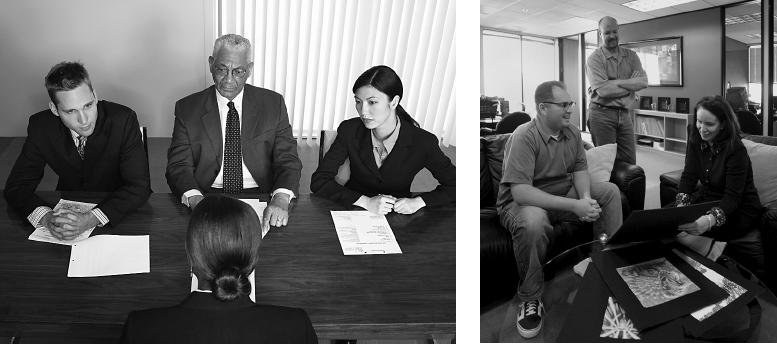Roles and Responsibilities of the Interviewee
Roles and Responsibilities of the Interviewee
Page 373
One of the most important things that an interviewee can bring to the interview is a clear sense of personal goals.
True, the interviewer is responsible for quite a bit of work in an interview situation, but that doesn’t mean that the interviewee is off the hook. If you are the interviewee, you will benefit greatly by clarifying your personal goals, being prepared, listening and responding effectively, and adapting to the interviewer and the situation.
Clarify and Fulfill Personal Goals. One of the most important things that an interviewee can bring to the interview is a clear sense of personal goals. That is, you should have a clear idea of what you want to achieve in the interview; this allows you to look for and seek out opportunities to advance those aims, such as looking for specific openings in the conversation (Waldron & Applegate, 1998). A job interviewee—whose goal it might be to impress a hiring manager—can seek out appropriate places to give examples of his or her energy, drive, and willingness to be a team player. An informational interviewee may advance the public relations goals of her organization by selecting information to be shared with the press.
Prepare Yourself Responsibly. Your school’s career services office and your previous employment situations have likely prepared you for the fact that you’ll need to draft a résumé and a cover letter in advance of a job interview. But all interviews, from job interviews to legal interviews, benefit from some advance planning.
For one thing, you’ll want to be well rested and alert for the interview. From personal experience, we urge you not to skip meals—more than a few of our students have had growling stomachs during interviews! You’ll also want to consider the context and be dressed appropriately for the occasion; this is especially important for official job interviews, where you should match or exceed the dress policy at that place of business. Also remember to plan what you should bring with you to the interview: copies of your résumé to a job interview, for example, or your medical history to an interview with a new doctor.
Listen and Respond Effectively. Just as interviewers must listen and respond effectively, so must the interviewee. For example, in a performance appraisal, carefully consider your answers to your boss’s questions. If she asks you to assess what you have accomplished and excelled at, honestly highlight your individual achievements or your contributions to the team you work with—without exaggerating.

Adapt to the Interviewer and the Situation. It is the interviewee’s responsibility to adapt to the interviewer and the interview situation appropriately—particularly with verbal and nonverbal communication. If a professor in your department is interviewing you to see if you would be a good fit for your college’s honors program, you should plan on looking at the interview quite formally. For example, you would use professional, formal address when speaking to the professor (“Professor Arisetty” or “Dr. Edmunds”). But if you have known this professor for three years, you babysit her children, and she insists that you call her Emilia, you can adapt, feeling free to use her first name and a less strict, more personal style of conversation.
Culture also plays a profound role in job interview situations (Gardner, Reithel, Foley, Cogliser, & Walumbwa, 2009). As an interviewee or as an interviewer, you should expect to adapt to the culture of your communication partner. For example, many people from various ethnic and religious backgrounds find it difficult to brag about their accomplishments at a job interview because their culture frowns on such boastful behavior. Research shows that rather than clearly state a strength (“I have extremely strong organizational skills”), African American interviewees often tell stories about themselves to illustrate their strengths (Hecht, Jackson, & Ribeau, 2003). Researchers also note that European American interviewers often judge storytelling candidates to be “unfocused.” Thus, African Americans who adapt by directly listing their strengths for a job are perceived more positively in interviews (Hecht, Jackson, & Ribeau, 2003); conversely, a European American interviewer who looks for the message behind the story an interviewee tells has competently adapted as well.
LearningCurve